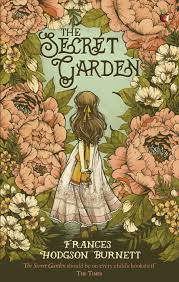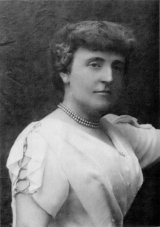The Secret Garden Page #2
The Secret Garden is a novel by Frances Hodgson Burnett first published in book form in 1911, after serialization in The American Magazine. Set in England, it is one of Burnett's most popular novels and seen as a classic of English children's literature. Several stage and film adaptations have been made.
Many things happened during the hours in which she slept so heavily, but she was not disturbed by the wails and the sound of things being carried in and out of the bungalow. When she awakened she lay and stared at the wall. The house was perfectly still. She had never known it to be so silent before. She heard neither voices nor footsteps, and wondered if everybody had got well of the cholera and all the trouble was over. She wondered also who would take care of her now her Ayah was dead. There would be a new Ayah, and perhaps she would know some new stories. Mary had been rather tired of the old ones. She did not cry because her nurse had died. She was not an affectionate child and had never cared much for anyone. The noise and hurrying about and wailing over the cholera had frightened her, and she had been angry because no one seemed to remember that she was alive. Everyone was too panic-stricken to think of a little girl no one was fond of. When people had the cholera it seemed that they remembered nothing but themselves. But if everyone had got well again, surely someone would remember and come to look for her. But no one came, and as she lay waiting the house seemed to grow more and more silent. She heard something rustling on the matting and when she looked down she saw a little snake gliding along and watching her with eyes like jewels. She was not frightened, because he was a harmless little thing who would not hurt her and he seemed in a hurry to get out of the room. He slipped under the door as she watched him. “How queer and quiet it is,” she said. “It sounds as if there were no one in the bungalow but me and the snake.” Almost the next minute she heard footsteps in the compound, and then on the veranda. They were men’s footsteps, and the men entered the bungalow and talked in low voices. No one went to meet or speak to them and they seemed to open doors and look into rooms. “What desolation!” she heard one voice say. “That pretty, pretty woman! I suppose the child, too. I heard there was a child, though no one ever saw her.” Mary was standing in the middle of the nursery when they opened the door a few minutes later. She looked an ugly, cross little thing and was frowning because she was beginning to be hungry and feel disgracefully neglected. The first man who came in was a large officer she had once seen talking to her father. He looked tired and troubled, but when he saw her he was so startled that he almost jumped back. “Barney!” he cried out. “There is a child here! A child alone! In a place like this! Mercy on us, who is she!” “I am Mary Lennox,” the little girl said, drawing herself up stiffly. She thought the man was very rude to call her father’s bungalow “A place like this!” “I fell asleep when everyone had the cholera and I have only just wakened up. Why does nobody come?” “It is the child no one ever saw!” exclaimed the man, turning to his companions. “She has actually been forgotten!” “Why was I forgotten?” Mary said, stamping her foot. “Why does nobody come?” The young man whose name was Barney looked at her very sadly. Mary even thought she saw him wink his eyes as if to wink tears away. “Poor little kid!” he said. “There is nobody left to come.” It was in that strange and sudden way that Mary found out that she had neither father nor mother left; that they had died and been carried away in the night, and that the few native servants who had not died also had left the house as quickly as they could get out of it, none of them even remembering that there was a Missie Sahib. That was why the place was so quiet. It was true that there was no one in the bungalow but herself and the little rustling snake. CHAPTER II MISTRESS MARY QUITE CONTRARY Mary had liked to look at her mother from a distance and she had thought her very pretty, but as she knew very little of her she could scarcely have been expected to love her or to miss her very much when she was gone. She did not miss her at all, in fact, and as she was a self-absorbed child she gave her entire thought to herself, as she had always done. If she had been older she would no doubt have been very anxious at being left alone in the world, but she was very young, and as she had always been taken care of, she supposed she always would be. What she thought was that she would like to know if she was going to nice people, who would be polite to her and give her her own way as her Ayah and the other native servants had done. She knew that she was not going to stay at the English clergyman’s house where she was taken at first. She did not want to stay. The English clergyman was poor and he had five children nearly all the same age and they wore shabby clothes and were always quarreling and snatching toys from each other. Mary hated their untidy bungalow and was so disagreeable to them that after the first day or two nobody would play with her. By the second day they had given her a nickname which made her furious. It was Basil who thought of it first. Basil was a little boy with impudent blue eyes and a turned-up nose, and Mary hated him. She was playing by herself under a tree, just as she had been playing the day the cholera broke out. She was making heaps of earth and paths for a garden and Basil came and stood near to watch her. Presently he got rather interested and suddenly made a suggestion. “Why don’t you put a heap of stones there and pretend it is a rockery?” he said. “There in the middle,” and he leaned over her to point. “Go away!” cried Mary. “I don’t want boys. Go away!” For a moment Basil looked angry, and then he began to tease. He was always teasing his sisters. He danced round and round her and made faces and sang and laughed. “Mistress Mary, quite contrary, How does your garden grow? With silver bells, and cockle shells, And marigolds all in a row.” He sang it until the other children heard and laughed, too; and the crosser Mary got, the more they sang “Mistress Mary, quite contrary”; and after that as long as she stayed with them they called her “Mistress Mary Quite Contrary” when they spoke of her to each other, and often when they spoke to her. “You are going to be sent home,” Basil said to her, “at the end of the week. And we’re glad of it.” “I am glad of it, too,” answered Mary. “Where is home?” “She doesn’t know where home is!” said Basil, with seven-year-old scorn. “It’s England, of course. Our grandmama lives there and our sister Mabel was sent to her last year. You are not going to your grandmama. You have none. You are going to your uncle. His name is Mr. Archibald Craven.” “I don’t know anything about him,” snapped Mary. “I know you don’t,” Basil answered. “You don’t know anything. Girls never do. I heard father and mother talking about him. He lives in a great, big, desolate old house in the country and no one goes near him. He’s so cross he won’t let them, and they wouldn’t come if he would let them. He’s a hunchback, and he’s horrid.”
Translation
Translate and read this book in other languages:
Select another language:
- - Select -
- 简体中文 (Chinese - Simplified)
- 繁體中文 (Chinese - Traditional)
- Español (Spanish)
- Esperanto (Esperanto)
- 日本語 (Japanese)
- Português (Portuguese)
- Deutsch (German)
- العربية (Arabic)
- Français (French)
- Русский (Russian)
- ಕನ್ನಡ (Kannada)
- 한국어 (Korean)
- עברית (Hebrew)
- Gaeilge (Irish)
- Українська (Ukrainian)
- اردو (Urdu)
- Magyar (Hungarian)
- मानक हिन्दी (Hindi)
- Indonesia (Indonesian)
- Italiano (Italian)
- தமிழ் (Tamil)
- Türkçe (Turkish)
- తెలుగు (Telugu)
- ภาษาไทย (Thai)
- Tiếng Việt (Vietnamese)
- Čeština (Czech)
- Polski (Polish)
- Bahasa Indonesia (Indonesian)
- Românește (Romanian)
- Nederlands (Dutch)
- Ελληνικά (Greek)
- Latinum (Latin)
- Svenska (Swedish)
- Dansk (Danish)
- Suomi (Finnish)
- فارسی (Persian)
- ייִדיש (Yiddish)
- հայերեն (Armenian)
- Norsk (Norwegian)
- English (English)
Citation
Use the citation below to add this book to your bibliography:
Style:MLAChicagoAPA
"The Secret Garden Books." Literature.com. STANDS4 LLC, 2024. Web. 21 Dec. 2024. <https://www.literature.com/book/the_secret_garden_427>.




Discuss this The Secret Garden book with the community:
Report Comment
We're doing our best to make sure our content is useful, accurate and safe.
If by any chance you spot an inappropriate comment while navigating through our website please use this form to let us know, and we'll take care of it shortly.
Attachment
You need to be logged in to favorite.
Log In